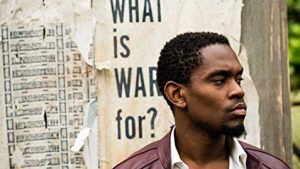(Akiit.com) Yardie is a term that is used to refer to people of Jamaican origin. It’s also a slang patois name for Jamaican gangs and gang members. Want to no more? Come for the movie. Stay for the culture, music and a street-smart education.
Actor Idris Elba turns a lifelong fascination with the book Yardie, by Victor Headley, into his directing debut. His passion for the story, Jamaica, its music and an immigrant’s life is evident in every frame. Though the film’s direction and script do not live up to his enthusiasm, there are memorable moments buried in this 1hr 41min island/urban tale.
In 1970s Kingston, Jamaica, two brothers try to cool the fiery tension between warring gangs by throwing a music party in their community. Jerry (Everaldo Creary), a Rastafarian, is the one-love DJ. His little bro Young D (Antwayne Eccelston) looks on. The heads of two rival crews are pulled onstage to prove that peace is in the air. A shot rings out and Jerry is killed. Young D sees the perpetrator and is haunted by the experience.
DJ. His little bro Young D (Antwayne Eccelston) looks on. The heads of two rival crews are pulled onstage to prove that peace is in the air. A shot rings out and Jerry is killed. Young D sees the perpetrator and is haunted by the experience.
Years later in the ‘80s, a now-twentysomething D (Aml Ameen, The Maze Runner) is sent by a drug lord from Jamaica to the East End of London to deliver coke. D makes his connection with an uppity, high-strung dealer, but things go awry. He seeks solace in the arms of his old girlfriend Yvonne (Shantol Jackson). She’s a nurse who lives in London with a young daughter and thinks she’s escaped the turbulence of Kingston. Yvonne welcomes D back into her life and home only to find out that his troubles are coming too.
The basic plot lays down a strong foundation that has the potential for being a tense gangster/crime/drama fueled by revenge. Credit the cult-classic novel for the blueprint. Blame the screenwriters for laying on way on too many characters and subplots, which overpower the story’s essence. Brock Norman Brock (a British playwright) and Martin Stellmen (screenwriter for the 1980s Jamaican/English film Babylon and writer/director of the 1988 Denzel Washington movie For Queen & Country) have created a script that feels convoluted and bloated.
Elba pours his heart and soul into this immigrant’s odyssey. If anything, his over-ambitious but well-intentioned direction heads down too many paths. Simplicity, brevity and a single focus would have served the narrative and his efforts better. From opening sequences, the audience knows that D is in an emotional free fall due to his bother’s death. No need to show a slew of flashbacks to explain what he’s feeling. Skip the images of Jerry’s ghost. Viewers know the backstory and there’s no need to browbeat them with cuts back to that ill-fated day.
Incessant voiceovers weigh the footage down, too. Books use words to relay what characters think—there’s no other means of expression. Movies have a blank canvass. Elba didn’t have to verbalize characters’ thoughts. He should have trusted the action and actors to express feelings and tell the story. D’s distress is on Ameen’s face and evident in all the wrong choices the character makes. And don’t, don’t, don’t repeat the same dialogue again and again. No need to belabor points. The script, direction and editing (Justine Wright) have to take the blame if they go against conventional filmmaking wisdom.
Sift through this weighty presentation, however, and there are some fun scenes and raw emotions: D’s introduction to three young male musicians starts a relationship among the quartet that is refreshing. He is jaded beyond his young years. The guys are just starting out. They’re naïve and impressionable, particularly a dude named Sticks (Calvin Demba, Kingsman: The Golden Circle). The boys are way too vulnerable to be put in harm’s way, but that’s their destiny.
D’s relationships with his fellow drug dealers are mistrustful and life-threatening. His sole refuge is his love for Yvonne. Scenes between Ameen and the very gifted actress Shantol Jackson give the film heart. If the very aimless D has chance at redemption, it’s with her.
The supporting cast is never less than professional. Listening to their deep patois is part of the fun and one of the film’s many beguiling introductions to Jamaican culture. No doubt actors from this cast will go on to bigger and better things.
Some technical aspects are right on the money: James Keast’s costumes, Damien Creagh’s production design along with the art direction by Alison Adams and Donna Noble vividly evoke the colors, clothes and images of the ‘70s and ‘80s. John Conroy’s (TV’s Luther) cinematography is very colorful, with moody nightclub lighting and bright exteriors all rolled into one.
The musical score by Dickon Hinchliffe (Winter’s Bone) is spaced nicely between a toe-thumping playlist courtesy of Elba, who is a noted DJ. Tunes by Yellowman, Black Uhuru, The Isley Bros and Dennis Brown are a who’s who of vibrant reggae and soul music. Adding in Grace Jones wailing on “My Jamaican Guy” makes the soundtrack a collector’s item.
Yardie starts with a voiceover by D that clearly states: “This is a story about the path I chose.” If that simple line had been the film’s only voiceover… If the script had fewer characters… If the editing had cut out all the repetition… If the filmmakers had decided to let the action tell the story…
There wouldn’t be a long list of “ifs,” had Yardie been stripped down to its core.
Columnist; Dwight Brown
Official website; http://DwightBrownInk.com









Leave a Reply